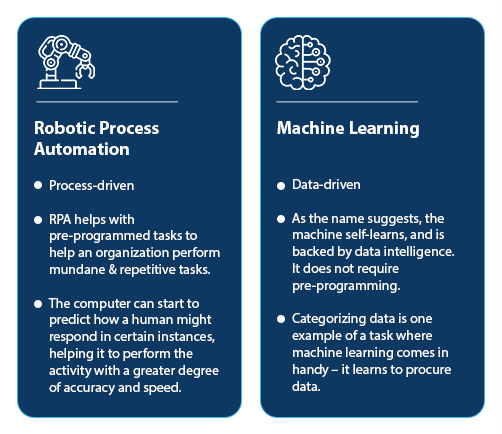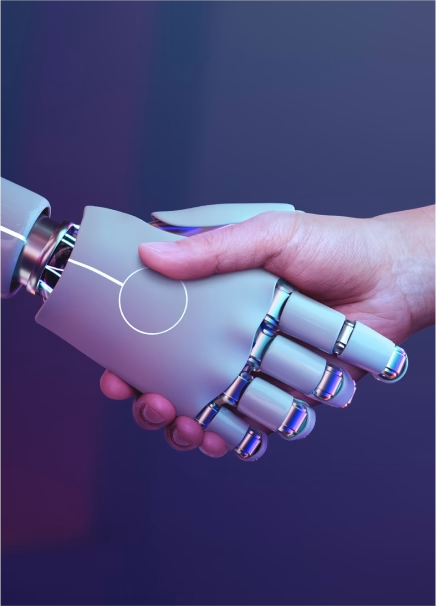We live in a time when technologies are constantly evolving, and there is always a need for efficient and fast-moving tech-enabled solutions. It is well-known that Robotic Process Automation (RPA) and Machine learning (ML) are currently essential technologies and the most talked-about technologies of this decade.
Today, these technologies drive growth and help businesses by optimizing costs incurred to manage people, processes and increase efficiencies of organizations. Not only this, but automation makes the mundane and complex processes easier and faster to increase the productivity of an organization.
The question is how different these technologies are from one another.
RPA or RPA bots can be defined as digital workers in business processes. In contrast, machine learning is the application of intelligence, which focuses on developing computer programs that can understand data and use it to learn for themselves to perform specific tasks better.
RPA bot automates, whereas machine learning processes are guided by lessons learned by following patterns after understanding existing data sets.
The difference between RPA and machine learning is that RPA doesn’t have any built-in intelligence, while machine learning works within a predefined knowledge area. RPA works as per the predefined rules whereas machine learning is structured to use historical data to make predictions.
Businesses aim to attain a large share of the market. It can become possible only when the processes streamline the workflow, reduce wastage, and adopt an automated format. The outcomes are better productivity, real-time insights, there is a probability of more customers increasing per year, and eventually, more revenue per work cycle.
These technologies can help gain better control over processes and streamline them in an optimized time and at a reduced cost. Before using these technologies, it is crucial to understand the difference:

The COVID-19 has shifted the focus of businesses towards rapid digital transformation and utilize smart systems to enhance their operational efficiency and to stay ahead in the ever-evolving market landscape while optimizing their resources & costs like never before, this has increased the willingness of firms to invest in automation and AI/ML technologies.
The market size of RPA stood at USD 1.29 billion in 2020, and the global robotic process automation (RPA) market size is estimated to reach USD 7.64 billion in 2028 as per a report titled “Robotic Process Automation Market Size, Share & COVID-19 Impact Analysis“. The Machine Learning enabled solutions are also being adopted extensively. It accounted for USD 6.9 billion in 2018 and is anticipated to value USD 96.7 billion until 2025.
RPA and AI/ML technologies will impact almost every sector in the years ahead. Tech-enabled solutions such as Robotic Process Automation bots assist in building a digital workforce, and strategic automation and technology like hyper-automation can combine and yield seamless process management, as well as Intelligent technologies like machine learning, will support the workforce to streamline workflows and processes.
In the end, we can conclude that Robotic Process Automation or RPA bots are the digital workers for an organization; Machine Learning is best utilized to speed up the data processing capabilities for better optimization of the three – Processes, Resources, and Costs. Both technologies are equally important for driving the growth of the organization.
Cygnet Infotech, in recent years, has assisted many clients with high-velocity data by using emerging technologies like AI/ML and through RPA bot’s implementation. We help automate business processes and ease implementation of various manual tasks through our offerings & expertise for clients in industries such as BFSI, Logistics, Real estate, and others. For example, the Data management accuracy of a giant Pharma client was increased by 99% through our Automation Platform, which helped in reducing the overall manual data processing time from 5 days to 10-15 mins.
